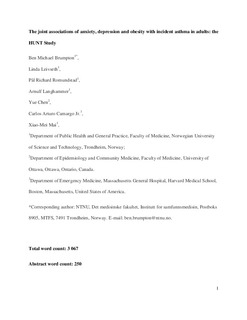The joint association of anxiety, depression and obesity with incident asthma in adults: the HUNT Study
Brumpton, Ben Michael; Leivseth, Linda; Romundstad, Pål Richard; Langhammer, Arnulf; Chen, Yue; Camargo, Carlos; Mai, Xiao-Mei
Abstract
Background Anxiety or depression symptoms may increase the risk of developing asthma, and their interaction with obesity is not known. We aimed to assess the association of anxiety or depression symptoms and the joint association of these symptoms and obesity with incident asthma.
Methods We conducted a prospective cohort study of 23 599 adults who were 19–55 years old and free from asthma at baseline in the Norwegian Nord–Trøndelag Health Study. The Hospital Anxiety and Depression Scale was used to measure anxiety or depression symptoms. Obesity was defined as a body mass index ≥30.0 kg/m2. Incident asthma was self-reported new cases of asthma during the 11-year follow-up.
Results Having anxiety or depression symptoms was associated with incident asthma [odds ratio (OR) 1.39, 95% confidence interval (CI) 1.09–1.78). Obese participants with anxiety or depression symptoms had a substantially higher risk of incident asthma (OR 2.93, 95% CI 2.20–3.91) than any other group (non-obese participants without anxiety or depression symptoms [reference], non-obese participants with anxiety or depression symptoms (OR 1.20, 95% CI 1.00–1.45) and obese participants without anxiety or depression symptoms (OR 1.47, 95% CI 1.19–1.82)]. The relative excess risk for incident asthma due to interaction between anxiety or depression symptoms and obesity was 1.26 (95% CI 0.39–2.12).
Conclusions This study suggests that having anxiety or depression symptoms contributes to the development of asthma in adults. The risk of asthma may be further increased by the interaction between anxiety or depression symptoms and obesity.
